We’ve all heard the old cliché, “The bigger they come, the harder they fall.” It’s intended figuratively — e.g., the fall of high-profile big wigs — but recent research lends the phrase literal meaning as well. In an obvious sense, the more you weigh, the harder you’ll hit the pavement when you stumble. But all those extra pounds also make you more likely to fall in the first place, a new study suggests.
Syracuse University researchers followed 10,755 seniors for eight years, correlating the incidence of accidental falls with Body Mass Index (BMI). During that time there were 9,621 falls, about a third of which were serious enough to require medical care. Sorted by weight, those in the obese category were 50% more likely to have a fall — and nearly 40% more likely to suffer long-term injury as a result.
Why might this be? Obesity is linked to muscle weakness, leg pain, cognitive and balance deficits, and vitamin D deficiency, that collectively increases fall risk. Also, contrary to conventional wisdom, excess body fat actually increases osteoporosis risk, making overweight fall victims more prone to broken bones. Worse still, overweight patients who end up needing hospitalization have a double risk of wound infection, as well as lower accuracy in diagnostic scans.
A third of seniors fall annually, resulting in as many as 20,000 deaths per year. Losing extra pounds might not just improve balance, it protects against a range of age-related ailments, such as heart disease, dementia, incontinence and macular degeneration. Regardless of weight, practicing yoga and Tai Chi can help build balance. Seniors should also watch alcohol intake, as diminished ability to metabolize ethanol could further contribute to fall risk.



